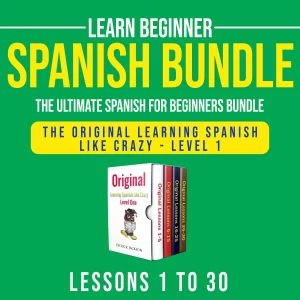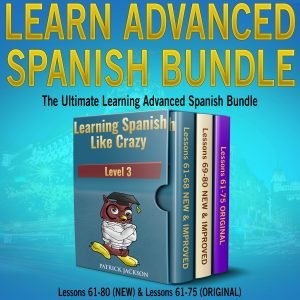Uses of tener
Tener, as you know, is an e–ie stem-changing verb with an irregular yo form. It is usually translated as to have. Understanding how to use verbs is a good start, but in order to use tener effectively, you must be aware of its special applications in Spanish. How is tener used in this paragraph?
Tengo una hermana. Ella tiene diecisiete años. Hoy, mi hermana tiene que ir al médico. El doctor pregunta <<¿Qué tienes?>> <<Tengo dolor de estómago>> contesta mi hermana. <<Quizás tienes hambre>> dice el doctor.
I have a sister. She is seventeen years old. Today, my sister has to go to the doctor. The doctor asks, “What’s wrong?” “I have a stomachache,” answers my sister. “Maybe you’re hungry,” says the doctor.
There are three examples in the paragraph where tener is used the same way as to have in English. They are:
|
Tengo una hermana. |
I have a sister. |
| Tiene que ir al médico. | She has to go to the doctor. |
| <<Tengo dolor de estómago.>> | “I have a stomachache.” |
Notice that the expression tener que is translated as have to, and like English, the expression is a synonym for must or need to.
What about the other two examples? Look at the doctor’s question, <<¿Qué tienes?>> Literally, he is asking “What do you have?” He wants to know her symptoms. An English speaker could easily misinterpret the question; in slapstick comedy, the exchange might go something like this:
“Doc, I’m sick.”
“What do you have?”
“I don’t know, that’s why I’m here.”
Many Americans understand the question to mean, “What is your diagnosis?” instead of “What are your symptoms?” The question does not have the same ambiguity in Spanish. In the doctor’s office example, “What do you have?” is not an incorrect translation, but “What’s wrong?” or “What’s the matter?” sound a bit more natural and to the point. ¿Qué tienes? is used to inquire about physical symptoms, but it is also a common response to tears, a frown, or any other unhappy expression. In this case, the question conveys, “I know there’s something upsetting you, what is it?” Depending on the tone of voice, it may sound more like, “What’s your problem?” Translating the question as “What do you have?” in this case would confuse most English speakers, American or otherwise. You want to know what’s wrong, so just ask.
Expressing age in Spanish has nothing to do with the way we do it in English. Just as it would sound totally foreign and almost laughably incorrect to say, “She has seventeen years,” it is TOTALLY INCORRECT to say, “Ella es diecisiete años viejo.” That mangled sentence induces wincing among Spanish teachers; it was actually painful for me to type. There’s no way around it—Spanish and English are different languages. With that in mind, here is the correct way to express age in Spanish:
Subject (optional) form of tener number años.
Yo tengo 29 años.
Mi novio tiene 32 años.
Finally, tener is very commonly used in these expressions:
| tener hambre | to be hungry (“to have hunger”) |
| tener sed | to be thirsty |
| tener sueño | to be sleepy |
| tener calor | to be hot (to feel overheated) |
| tener frío | to be cold |
Tener expressions are used much more frequently than the corresponding adjective forms. This may be the reason the question ¿Qué tienes? is so readily understood by Spanish speakers. ¿Qué tienes? Tengo sueño. ¿Qué tienes? Tengo tos.
Using gustar
Let’s begin by watching gustar in action:
| Me gustan los gatos. | I like cats. |
| A mi amiga le gustan los perros. | My friend likes dogs. |
| A ellos les gustan las iguanas. | They like iguanas. |
| ¿Qué te gusta a ti? | What do you like? |
| A los niños les gusta el verano. | Children like the summer. |
| Nos gusta el chocolate. | We like chocolate. |
If you’ve been studying, this should look strange to you—why are we using indirect object pronouns instead of personal pronouns? The answer is that gustar doesn’t actually mean to like—literally, it means to be pleasing to. Let’s take the same examples again and translate more literally:
| Me gustan los gatos. | Cats are pleasing to me. |
| A mi amiga le gustan los perros. | Dogs are pleasing to my friend. |
| A ellos les gustan las iguanas. | Iguanas are pleasing to them. |
| ¿Qué te gusta a ti? | What is pleasing to you? |
| A los niños les gusta el verano. | The summer is pleasing to children. |
| Nos gusta el chocolate. | Chocolate is pleasing to us. |
Notice that even the literal translation isn’t word-for-word. The literal equivalent of the first example is, “To me are pleasing the cats.” Ay-ay-ay. The expression sounds perfectly reasonable in Spanish, but downright bizarre in English. This is why instant, mechanical online “translations” are usually terrible—languages are never perfectly parallel to other languages, and never perfectly consistent within themselves. As a beginner, it isn’t wrong to translate literally in your head, as long as you realize that the finished form should sound like natural English, even if it means rearranging the sentence. The same goes for when you write in Spanish—you must follow the rules for Spanish sentences, no matter how different they are from English.
Let’s stay with the first example. Me of course refers to me, los gatos of course are the cats—but why is it gustan instead of gusta? Look at the other examples—why are some gustan and some gusta? Remember that the verb means to be pleasing to. Cats are pleasing to me. Chocolate is pleasing to us—do you see the difference? Use gustan when the subject is plural: Me gustan los gatos. Use gusta when the subject is singular: Nos gusta el chocolate.
Now that I’ve explained how it works grammatically, I hereby give you permission to just memorize the accepted translations. Remember, if you like one thing, use gusta; if you like two things, use gustan. Memorize these:
| me gusta | I like |
| te gusta | you like |
| le gusta | he likes, she likes, Ud. likes |
| nos gusta | we like |
| les gusta | they like, Uds. like |
As you may recall from Lesson 3, le and les require additional clarification. Sentences will include a phrase such as a ella to clarify le. For emphasis, a mí and a ti may be added as well. Observe:
| A mis padres les gusta el béisbol. | My parents like baseball. |
| No me gusta a mí. | I don’t like it. |
| A mi novio le gusta el fútbol. | My boyfriend likes soccer. |
One more thing: to say that you don’t like something, just add no.
no me gusta
no te gusta
no le gusta
no nos gusta
no les gusta
Practice
You’ve had ten lessons—it’s time for you to communicate on paper! Write a short paragraph about yourself in Spanish (at least six sentences). Include these topics: your family, your age, your pets, likes and dislikes. You may include other information as well, but write at least four sentences about the required topics. A sample paragraph is included below; obviously, it should be different from your paragraph! For extra credit, translate my paragraph.
P. S. Don’t limit yourself to vocabulary we’ve studied. You already know how to work with most present-tense verbs, so use your dictionary and just jump in.
Yo vivo con mi hermana. Yo tengo 29 años y ella tiene 27 años. Tenemos un gato. El gato es gordo. No me gustan los deportes. A mi novio le gustan el béisbol, el fútbol, el fútbol americano, el hockey, el golf… para mi son aburridos. Me gusta leer y trabajar en mi jardín. Tengo tomates y pimientos.
Answers
I live with my sister. I am 29 years old and she is 27 years old. We have a cat. The cat is fat. I don’t like sports. My boyfriend likes baseball, soccer, football, hockey, golf… for me, that’s boring.* I like to read and work in my garden. I have tomatoes and peppers.
*literally, “for me they are boring.”





